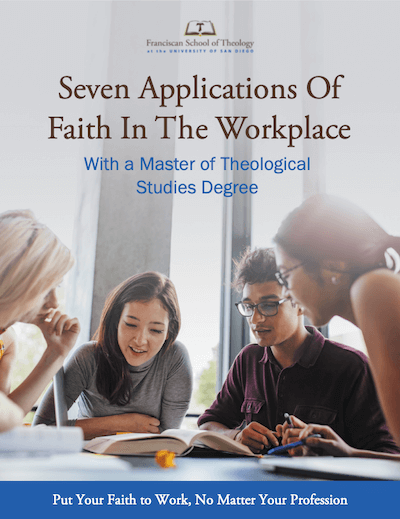As you explore your degree options for building a deeper connection to your faith, you may come across some similar — and potentially confusing — degree program titles. Those who want to pursue a religious career or study faith in a rigorous academic setting have the option of entering either a Master of Theological Studies, Master of Divinity, or Master of Ministry degree program. While similar, each of these programs offer varying academic and professional opportunities.
At a fundamental level, theology, divinity, and ministry are themselves unique disciplines and areas of study.
Theology is the study of religion, religious thought, and how faith is experienced, observed and reflected in literature, tradition, worship, language, and art. Theologians — those who study theology — take a philosophical approach to faith, posing and debating the answers to questions about life’s meaning and the existence of the divine.
Divinity is the nature of divine entities and all things that come from them. The study of divinity can include more than one religion, and can be a step on the way to becoming ordained to lead within a religion.
Ministry is the practice of leading within a religious framework or institution; for example, as a priest or pastor. Ministry can also include activities that adherents carry out to express or spread their faith, either to those within their faith or outside of it.
In terms of choosing a master’s degree program that best aligns with your goals, you’ll need to determine which of these three academic approaches will help you achieve your professional and personal objectives.
What is a Master of Theological Studies?
Also called a Master of Theology, this master’s degree is the best choice for those who want to approach their faith from an academic perspective. While theology programs can cover multiple religions, there is often one primary faith that guides the program — such as Thomistic or Franciscan Catholicism — and provides a lens through which instructors select and students interpret course material.
Students in a Master of Theological Studies (MTS) program will examine the languages, beliefs, history, and cultural impact of religion throughout the centuries and today. Some programs offer specialties, such as Biblical studies, history, systematic theology, liturgy, or ethics. Students with strong critical thinking, writing, and analytical skills will have success in an MTS program, as will those who have a background in philosophy or history (such as a bachelor’s degree). An MTS is often required to teach religion at the secondary school or community college level, and is the minimum degree required by the Association of Theological Schools (ATS) to teach at an accredited Bible college.
What is a Master of Divinity?
With a more practical approach to faith than theology, a Master of Divinity program prepares graduate-level students for a career in active ministry. A Theological Studies program may focus on any number of religions, but a Master of Divinity (MDiv) primarily focuses on the Christian faith, or a specific denomination within Christianity.
MDiv students study the Hebrew Bible (or old testament) and (Christian) New Testament, Bible interpretation, Christian ethics and theology, ministry, and spiritual counseling. An MDiv program may offer specializations in any of these areas of study, and there is an optional capstone component. MDiv degree programs typically include a supervised apprenticeship or temporary placement with a parish.
To be accepted into an MDiv program, applicants must have an active relationship with their church; this can include volunteering as a deacon, leading Bible study groups, or conducting a youth ministry program in their parish.
The MDiv is the most common professional degree for those pursuing ministry in North America; however, completion of an MDiv program does not equate to ordination, which is a separate process. Graduates may also be qualified to teach religion or theology at the university level. This degree program typically takes three years to complete on a full-time schedule.
What is a Master of Ministry?
While its name might indicate otherwise, a Master of Ministry (MMin) program does not necessarily prepare graduates to enter ministry. Rather, this type of graduate program has a broader focus on the Christian “ministerial arts,” and can include elements of theology, Bible study and interpretation, and liberal arts like communication and education. In fact, this degree is sometimes referred to as a Master of Arts (MA) in theology or ministry. Even with a broad approach, an MMin or MA program may focus on one Christian denomination.
Someone hoping to teach religion at the secondary school or college level may complete an MMin degree, but additional professional certification may be required. MMin degree programs, which typically take two years to complete, can be separated into two categories: professional and academic.
A professional MMin provides broad training in philosophy, history, education, and psychology as they pertain to ministry, and can offer specializations in:
- Local church-based ministry
- Age-specific group ministries like youth ministry, children’s ministry, and adult ministry
- Camp and campus ministry
- Urban studies
An academic MMin can be much more research-heavy than a professional track. It is more tailored to those who wish to teach religion or theology at the higher education level, and who will go on to further schooling. The capstone component of this program may often include a written thesis intended for publication.
Degree Comparison
| Master of Theological Studies | Master of Divinity | Master of Ministry | Master of Theological Studies – Franciscan Theology | |
| Time to Complete | 1–2 years | 3 years | 2 years | 2 years |
| Application Requirements |
|
|
|
|
| Ideal For |
|
|
|
|
| Program Focus |
|
|
|
|
| Sample Coursework |
|
|
|
|
| Possible Careers |
|
|
|
|
How to Select the Right Degree for Your Goals
As you can see, your choice of degree depends on your ultimate goals. These goals can be professional or personal, or a combination of the two — or you may simply not yet be sure what your objective is. Whatever the case may be, there are some questions to consider that may help you identify and solidify your ideal academic outcome:
- What do you want to do after you earn your degree?
- What kind of difference do you want to make in your community or the world?
- What are you naturally good at? For example, do you excel at public speaking, listening, giving advice, studying, research, reflection…
- Which program prerequisites apply to you?
- How much time and money can you commit to a degree program?
- Do you have a personal set of beliefs that you would like to align with your studies?
Once you’ve answered these questions for yourself and chosen your preferred degree program, it’s time to talk to an advisor. An enrollment advisor can help you further define your goals, if necessary, and walk you through the program requirements.
Take any opportunity to connect with graduates of the program who can share their experience, especially how the program helped them achieve their academic, professional, and/or personal goals — or simply helped them live a more fulfilled life. Alternatively, you could seek out individuals who currently have the kind of jobs you’re considering, and ask them which educational track they took to get there.
Any decision about a Master of Theological Studies, Master of Divinity, or Master of Ministry degree program should also be informed by your research into the following:
- Quality and experience of faculty members
- School and program standing as compared to similar programs
- School’s ATS accreditation status
- Religious affiliation of school or program
- School’s history
- School/faculty availability and investment in students’ success
- Class accessibility — is there a format or schedule that will work best for you? E.g. online, part-time, full-time, on campus
- Curriculum specializations
An advisor can also provide you with this information during your initial conversation.
Frequently Asked Questions
Q. What’s the difference between a Master of Theological Studies and a Master of Divinity?
A. A Master of Theological Studies is considered an academic program, one that features extensive research and philosophical debate, and prepares graduates to enter a wide range of professions in or outside the church. A Master of Divinity will prepare students to enter the ministry, though completion of the degree does not equate to ordination.
Q. Should I get a degree in divinity or theology?
A. Your choice of degree depends on your ultimate goals. A degree in divinity will prepare you to enter the ministry or a spiritual leadership role. A degree in theology is much more academic, and will prepare you to teach religion, transition to more rigorous academic pursuits, or apply faith to other areas of your life or profession.
Q. How long does a Master of Theological Studies program take to complete?
A. A Master of Theological Studies program can take between one and two years to complete, depending on the course schedule and students’ availability.
Q. I’ve made my decision between an MDiv and MTS. What’s next?
A. If you’ve found a program that looks like the right fit, it’s time to talk to an advisor. An enrollment advisor can answer any questions you have, as well as put you in touch with current students or program graduates. If you’re applying to an MTS program, you’ll likely need to provide letters of recommendation, academic transcripts, and a statement of purpose.
Q. What is ATS accreditation?
A. The Association of Theological Schools (ATS) is the accrediting body for all schools that offer theological programs in the U.S. and Canada. The ATS sets the standard for theological education based upon whether a school embodies four core values: inclusion excellence, quality and improvement, collegiality, and leadership.
Q. I work full-time. Are there night or online degree options?
A. Yes! Many schools offer master’s degree programs on a nightly or part-time basis. Schools that offer online degree programs — like the University of San Diego — make coursework perpetually available to students so they can access materials on their own schedule. Online degree programs are also location-agnostic, meaning that anyone, anywhere is eligible to apply.
Q. I am a layperson. Can I consider any of these programs?
A. While a familiarity with religion is helpful for a Master of Theological Studies, Master of Divinity, or Master of Ministry program, it is not a requirement. Any of these programs may be based in a primary religion (like Franciscan Catholicism), but most MTS and MMin degree programs are designed so that the coursework is accessible to students of any faith.
Q. Do I need to learn other languages for any of these master’s degrees?
A. Some degree programs require a language component, though not all. Since many sacred texts were written in ancient languages, it can be helpful for students to become proficient in Greek, Hebrew, or Latin to gain the original meaning. In the MTS program at FST, the language component is not a requirement; students will be able to engage with faculty entirely in English.
Q. What prior experience do I need for a Master of Theological Studies program?
A. An academic background in philosophy is helpful for an MTS degree program, since theology emphasizes critical thinking and philosophical debates about the place of religion in society. A moderate familiarity with an MTS program’s primary religion is helpful, but not required.
Q. How much does a Master of Theological Studies program cost?
A. The price of tuition can vary depending on the school, format, and length of the program; for example, an online Master of Theological Studies – Franciscan Theology program costs $28,000 total, while the same degree from Harvard Divinity School is $30,472 per year.
There are plenty of scholarships available for those accepted to a Theological Studies master’s program. See this article for a list of applicable scholarships, or reach out to an advisor for more information.




![What is Theological Studies? [+ Degree Comparison]](https://onlinedegrees.sandiego.edu/wp-content/uploads/2022/01/what-is-theological-studies.jpg)